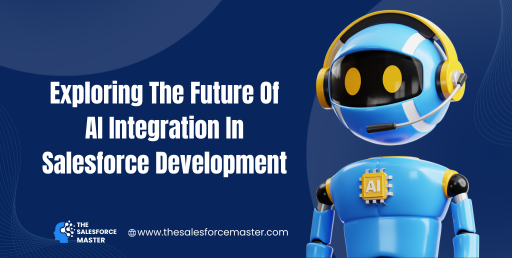
Navigating the Future of AI Integration in Salesforce Development
In the dynamic landscape of Salesforce development, the integration of AI technologies stands as a pivotal frontier, poised to revolutionize how businesses engage with their customers. With AI becoming increasingly ingrained in our daily lives, its integration within Salesforce ecosystems holds tremendous promise for marketers seeking to enhance their strategies and drive meaningful outcomes.
The Evolution of AI in Salesforce
From its inception, Salesforce has been at the forefront of innovation, constantly adapting to meet the evolving needs of businesses. As AI technologies mature, Salesforce has seamlessly incorporated them into its platform, empowering marketers with enhanced insights and automation capabilities.
Consequently, the integration of AI has become a cornerstone of Salesforce development, offering marketers unprecedented opportunities to optimize their workflows and deliver personalized experiences at scale.
AI-Powered Marketing Automation
Marketers leveraging Salesforce are increasingly turning to AI-driven automation to streamline their processes and improve efficiency. By harnessing AI algorithms, Salesforce Marketers can analyze vast amounts of data to uncover actionable insights, enabling targeted campaigns and predictive lead scoring.
Moreover, AI-powered automation empowers marketers to deliver hyper-personalized content, driving engagement and fostering stronger customer relationships.
Embracing Predictive Analytics
Predictive analytics represent another frontier in Salesforce development, enabling marketers to anticipate customer behavior and preferences with remarkable accuracy. By leveraging AI models, Salesforce Marketers can forecast trends, identify potential opportunities, and mitigate risks before they arise.
This proactive approach equips marketers with the foresight to tailor their strategies accordingly, maximizing ROI and driving sustainable growth.

As Salesforce Marketers navigate this transformative landscape, several key considerations emerge:
Seamless Integration: Ensuring AI solutions seamlessly integrate with existing Salesforce workflows is crucial to minimize disruptions and maximize productivity.
Data Privacy: Upholding stringent data privacy standards is paramount to maintain customer trust and comply with regulatory requirements.
Continuous Learning: Embracing a culture of continuous learning and upskilling is essential to harness the full potential of AI technologies within Salesforce.
Collaboration: Foster collaboration between data scientists, developers, and marketers to facilitate the effective implementation of AI solutions.
Scalability: Scalability is key to accommodating growing data volumes and evolving business needs, ensuring long-term success.
Ethical AI: Prioritize ethical considerations in AI development to mitigate biases and ensure fair and transparent outcomes.
Customer-Centricity: Keep the customer at the forefront of AI integration efforts, striving to deliver value and enhance the overall experience.
Experimentation: Encourage experimentation and iteration to uncover innovative use cases and refine AI-powered strategies over time.
Agility: Embrace agility to adapt to changing market dynamics and swiftly capitalize on emerging opportunities.
Measurement: Establish clear metrics and KPIs to evaluate the impact of AI integration on marketing performance and drive continuous improvement.
Conclusion:
In conclusion, the future of AI integration in Salesforce development holds immense promise for marketers, offering unparalleled opportunities to elevate their strategies and drive business success. By embracing AI-powered automation, predictive analytics, and a customer-centric approach, Salesforce Marketers can unlock new levels of efficiency, personalization, and innovation in their endeavours.
For more updates about the articles, subscribe to www.thesalesforcemaster.com


